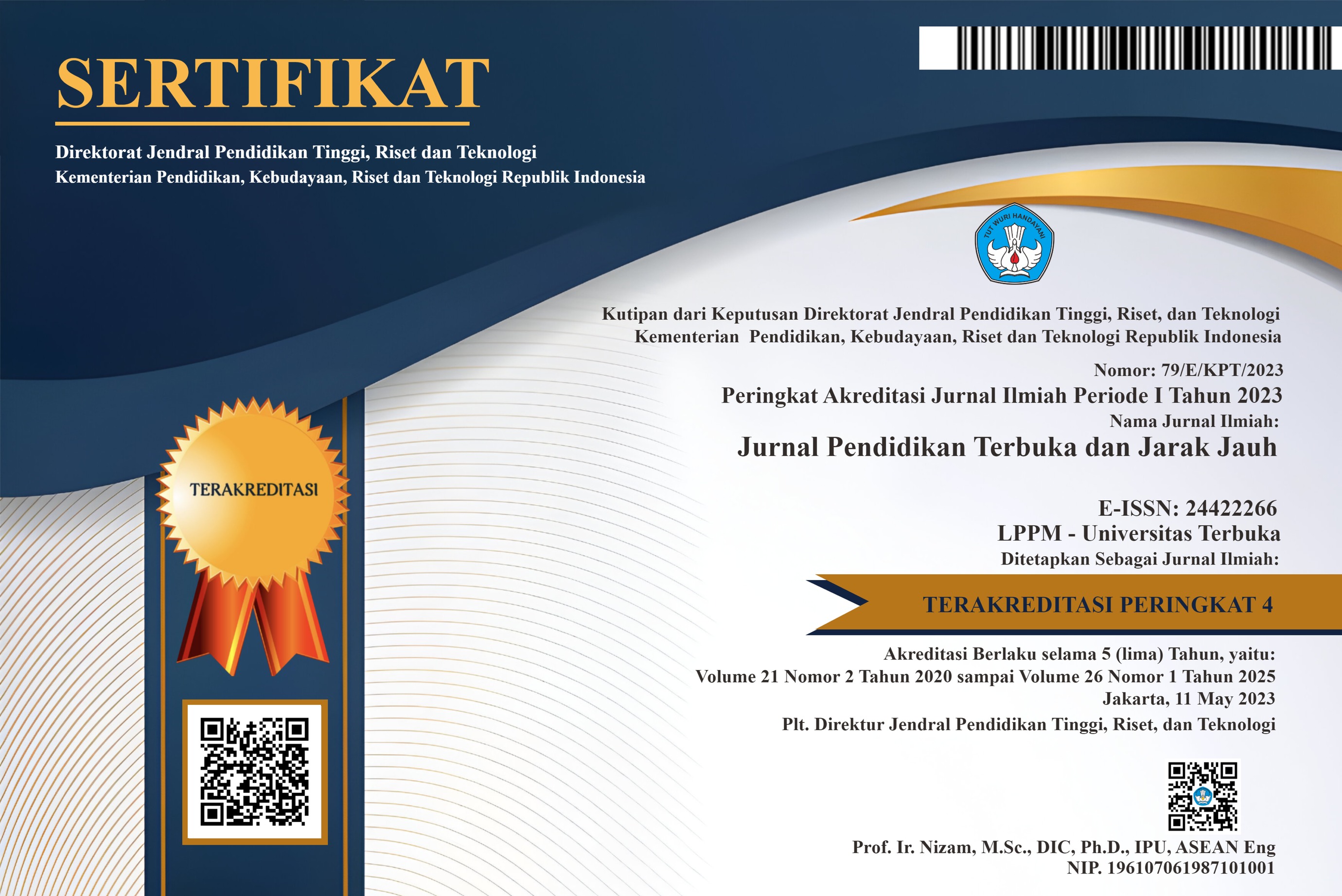PENDIDIKAN JARAK JAUH SEBAGAI SARANA PERBAIKAN LINGKUNGAN
Keywords:
distance learning, environmental education, open learningAbstract
Environmental issues at this time are very worrying it should be handled. This problem can happen because there is no awareness about problems of environment, and of non existing public education about the environment. Environmental education should be given since childhood, because the moral values received during childhood will not be easily forgotten. Presently, environmental education at the elementary level is ignored, because teachers who have knowledge in the field of environment is limited. Environmental education is very important for all, for that reason the socialization of environmental education is very crucial, especially for decision-makers, the bureaucrats and political elite, or those who can influence other people such as teachers and trainers. One alternative for environmental education is through the open and distance learning system. This system is very potential not only as a self-learning need, but also to enhance educational access. Distance learning system can be used for mass education, providing greater opportunity for people to study whenever they have time and wherever they are.
References
Brundtland, G.H. (1987). Our common future. World Commission on Environment and Development, Norwegia.
Keegan, D.(1980). On defining distance education. Journal Distance Education, 1 (1), 13-26.
Keraf, S.A. (2002). Etika lingkungan. Jakarta: Kompas.
KLH (Kementerian Lingkungan Hidup). (2004). Kebijakan pendidikan lingkungan hidup. Jakarta: KLH
LIPI. (13 Oktober 2003). Perkenalkan etika lingkungan lewat pendidikan formal. Diambil tanggal 7 April 2004 dari http://www.lipi.go.id/www/www.cgi?baca&1066027533.
Maulidin, M.A. (2009). Indonesia barat alami kerusakan terumbu karang terbesar. Warta Ekonomi. Diambil tanggal 30 Oktober 2009 dari http://www.wartaekonomi.co.id/index.php?option=com_content&view=article&id=1885:indonesia-barat-alami-kerusakan-terumbu-karang-terbesar-&catid=53:aumum
Pannen, P. dkk.. (1999). Cakrawala Pendidikan. Jakarta: Universitas Terbuka
Salim, E. (2004). Pembangunan berkelanjutan. Materi kuliah PSL 703: Kapita Selekta: Masalah Pembangunan dan Lingkungan. PS-PSL.IPB, Bogor.
Saifuddin, M. & Djunaidi, M. (2004). Pendidikan berwawasan lingkungan. Diambil tanggal 7 April 2004 dari http://www.suaramerdeka.com/harian/0402/09/kha1.htm.
Sidi, I. (2001). Pendidikan lingkungan masih terabaikan. Diambil tanggal 7 April 2004 dari http://www.suarapembaruan.com/News/2001/11/15/Kesra/ks02.html.
Soemarwoto.O. (1992). Indonesia dalam kancah isu lingkungan global. Jakarta: Gramedia
Soemarwoto.O. (2003). Analisis mengenai dampak lingkungan. Yogyakarta: Gadjah Mada University Press.
Soerjani, M. (2005). Pengertian dasar lingkungan hidup dalam pelaksanaan pendidikan. Reuni Akbar Alumni Ilmu Lingkungan Universitas Indonesia.
Undang-Undang Sistem Pendidikan Nasional, Nomor 20 tahun 2003, Departemen Pendidikan Nasional Republik Indonesia, Jakarta.
Undang-Undang Republik Indonesia Nomor 17 Tahun 2004 tentang Pengesahan Kyoto Protocol To The United Nations Framework Convention On Climate Change (Protokol Kyoto Atas Konvensi Kerangka Kerja Perserikatan Bangsa-Bangsa Tentang Perubahan Iklim), Depkumham, Jakarta.
Universitas Terbuka. (2009). Universitas Terbuka: 25 years making higher education open for all Indonesians. Tangerang: Universitas Terbuka.





